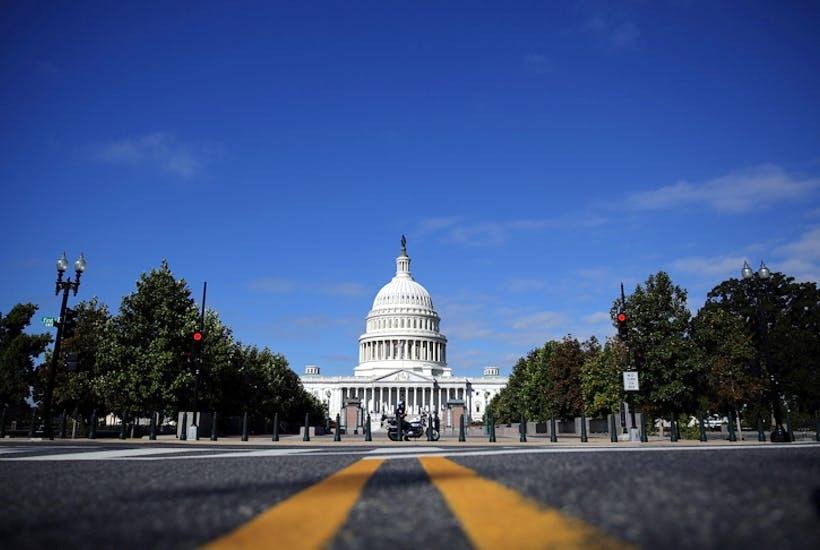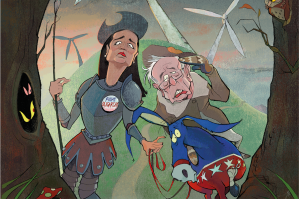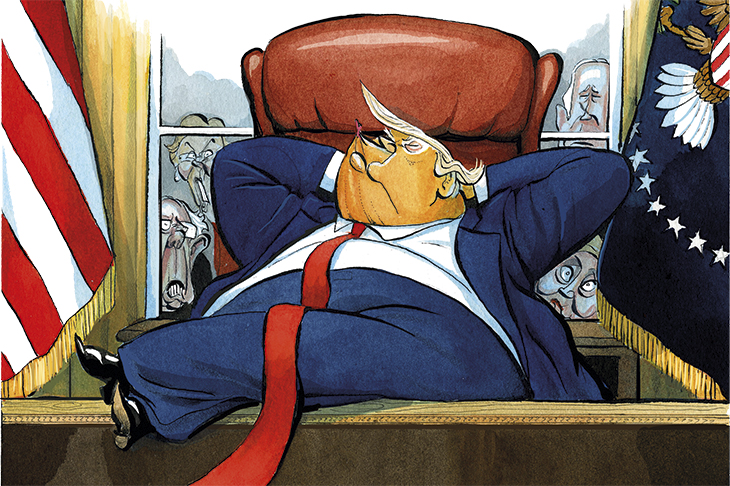Compared to previous instances in US history when political paralysis and dysfunction shut down Washington for weeks at a time, the three-day government shutdown that ended on Monday was a rather mundane and unremarkable occurrence. Indeed, unlike the 21-day saga in 1995-1996 between President Bill Clinton and House Republicans or the 16-day clash between House Republicans and President Barack Obama in 2013, this weekend’s fight had nothing to do with budget numbers, federal spending, tax rates, entitlements, or health care policy. It was, instead, largely a crisis manufactured by Senate Democrats in an attempt to pressure their Republican colleagues on the immigration issue, one of the most controversial topics in American politics.
Now that the impasse is over (until February 8, at least), Washington has sprung back to its ritualistic, intensely hyperpartisan nature. Turn on MSNBC, and you will witness liberal pundits calling Republicans incompetent at governing and divisive for refusing – yet again – to pass a bill that would allow about 800,000 immigrants who came to the United States as young children to stay in the country. Turn on Fox News, and you will hear conservatives deriding Democrats as amateurs and clowns who plunged America into a crisis just to ensure a vote on amnesty for illegal aliens. The partisan talking points and mindless drivel seeping from the air waves is about as unappetising to the average American as paying taxes.
This latest Washington drama, however, wasn’t all bad. The unhelpful finger-pointing and the childish antics would have gone on a lot longer if it were not for a group of two dozen moderate Republican and Democratic senators who decided to work together throughout the weekend in order to come to a consensual arrangement for the benefit of the country. This group, dubbed the Common Sense Coalition (CSC), demonstrated the fortitude, innovation, and pragmatism that once governed Washington back in the days of Bob Dole, George Mitchell and Howard Baker.
The New York Times, America’s paper of record, described the negotiations among these centrist lawmakers as the only constructive talks that happened in the Capitol during these last few days. The CSC was able to produce an agreement that fell far short of what many wanted, but was enticing enough for the majority of lawmakers to agree to. Once the compromise was presented to the party leaders and passed through the chamber, Sen. Chris Coons – a left-of-centre Democrat from Delaware and a member of the Coalition – was outright jubilant about what the bipartisanship achieved: ‘We can make a lasting difference in how the Senate of the United States works..We can get it back to working.’
While Coons may be exhibiting some misplaced optimism, the lawmaker is not wrong in his assessment about the body in which he is a member. The US Senate, the perennial institution that proudly refers to itself as ‘the greatest deliberative body in the world,’ has lost a significant amount of its luster over the last several years. Debates of national consequence, whether over the Affordable Care Act, tax reform, or a nuclear nonproliferation agreement with Iran, are too often dragged into the sewer and personalised as a referendum on whoever sits in the Oval Office at the time. Sometimes, it appears as if the days when senators focused on the substantive issues rather than the impugning of one another’s motives have already run out. In the old days of Dole and Robert Byrd, calling another senator a liar on the chamber floor or suggesting that a president’s nominee for Attorney General is a racist and a disgrace to the cause of justice would be an unthinkable violation of the rules. And the period of time when the filibuster was a tool used sparingly by the minority to force consensus has been replaced with filibusters for the purpose of pure obstructionism. The filibuster rules have been changed twice in four years as a result, the last being the abolition of the 60-vote supermajority for Supreme Court nominees.
What the Common Sense Coalition has shown Americans, however, is that the traditional way of doing things in the Senate is not yet completely dead. There are still lawmakers like Lindsey Graham of South Carolina, Susan Collins of Maine, Heidi Heitkamp of North Dakota, and Joe Manchin of West Virginia who will come together, regardless of party affiliation and strong disagreement on other issues, to take matters into their own hands when the partisanship is overheated. Who would have thought sitting in a room and negotiating a realistic compromise to get the government moving again was still possible?
Will centrist Republicans and Democrats in the future carry this newfound spirit on their shoulders and use it during the Senate debates to come? Or was the inter-party cooperation an isolated case under extraordinary circumstances? The answer will depend on how the upcoming fight over immigration policy and budget caps will be waged by party leaders. But this week, at least, political flexibility and pragmatism prevailed over extremism and base politics – a silver lining in an otherwise unfortunate episode.
Daniel R. DePetris is a political writer whose work has appeared in various publications, including the National Interest, the American Conservative, the Los Angeles Times, and the Washington Post.

























